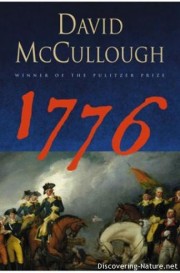1776
 David McCullough’s 1776 offers a gripping, detailed account of one year during the American Revolution — a year of desperate struggle, many losses, and a few key gains. It was a year when the “Glorious Cause” almost went belly-up under the pressure of poverty, lack of discipline, cowardice, and indecision at crucial moments. But as the year concluded, the tides turned, and though it would be another six and a half years before victory was achieved the course was set.
David McCullough’s 1776 offers a gripping, detailed account of one year during the American Revolution — a year of desperate struggle, many losses, and a few key gains. It was a year when the “Glorious Cause” almost went belly-up under the pressure of poverty, lack of discipline, cowardice, and indecision at crucial moments. But as the year concluded, the tides turned, and though it would be another six and a half years before victory was achieved the course was set.
Several things stood out to me as I read. One is the absolute rawness of the Continental Army. Not without cause did the British call them a “Rabble in Arms.” Without uniforms, without a majority tradition of military experience and discipline, without enough gifted leadership at the lower levels, the herd of men who enlisted as soldiers had a steep learning curve as they faced the highly trained British. More than once, in private, General Washington poured out his desperation:
Washington was a man of exceptional, almost excessive self-command, rarely permitting himself any show of discouragement or despair, but in the privacy of his correspondence with Joseph Reed, he began now to reveal how very low and bitter he felt, if the truth were known. Never had he seen “such a dearth of public spirit and want of virtue” as among the Yankee soldiers, he confided in a letter to Reed of November 28. “These people” were still beyond his comprehension. A “dirty, mercenary spirit pervades the whole,” he wrote. “Could I have foreseen what I have and am like to experience, no consideration upon earth should have induced me to accept this command.”
Unaccustomed to being told what to do, men often deserted, or temporarily left to visit family or tend crops at home, not bothering to communicate where they had gone, much less ask. Illness plagued the army in large part because of the “‘great neglect of people repairing to the necessaries.’ Instead, they voided ‘excrement about the fields perniciously.’ The smell of many camps was vile in the extreme.”
They are a difficult group to idealize. Yet on their willingness to fight in defense of their homes and their freedom, and on their awareness of “posterity,” America’s birth as a nation depends — every bit as much as on the educated, articulate men who codified our ideals in the Constitution. And amazingly, the unpromising Yankee soldiers did learn. From their stunning defeat at Brooklyn to their key victories at Trenton and Princeton, McCullough’s book traces the progress of the army’s hands-on education at every level from the lowest to the highest ranks. In addition to the rank and file, McCullough traces the trajectory of the exceptional men on whom Washington came to depend: Nathaniel Greene, Henry Knox, Joseph Reed, General Charles Lee.
The other thing that struck me was the force and power of Washington’s character. Few men survived an encounter with the general without being awestruck. He was not a flashy orator or a manipulator of people, but a man of such substantial character and ideals that they seemed to be seared into the consciousness of other men in lasting ways. He inspired loyalty and brought out the very best in those around him, as countless anecdotes attest. His belief in the American cause never wavered, though he was realistic and often despairing about the men in his command. A truly selfless leader who accepted a commission when his heart’s desire was to be at home directing the renovations of his estate and enjoying peaceful society, Washington sets the standard for a true public servant.
I loved the detail: excerpts from private correspondence, accounts by soldiers at all levels, maps, details of weather, and anecdotes fleshed out a complicated picture of these days hundreds of years ago, and the ordinary people whose bravery and persistence won the day. McCullough’s ability to weave together so much source material into a well-paced narrative made the book a fascinating read. There was violence and cruelty in these pages, as there must be in any account of war. I enjoyed the book so much that I found the audiobook at the library so I could continue the story while working around the house, and the whole family was drawn in. My youngest, turning to me in horror as we heard of Hessian soldiers bayoneting surrendering Americans after disarming them, asked me, “Why did you want to read this?”
“It’s what our country cost,” I replied. I recommend it as an honest, deeply interesting reminder of our roots as a nation. Most of all, it reminded me that the “American character” has always been a mixed bag. The people who won the nation’s initial battle for independence were not substantially different than we are today. Crisis refined them, to an extent, and they discovered ideals that raised them beyond the merely personal into a fortitude and endurance that achieved a lasting victory. For someone disheartened about the present, 1776 offers an honest review of the past that can provide bracing encouragement for the future.
